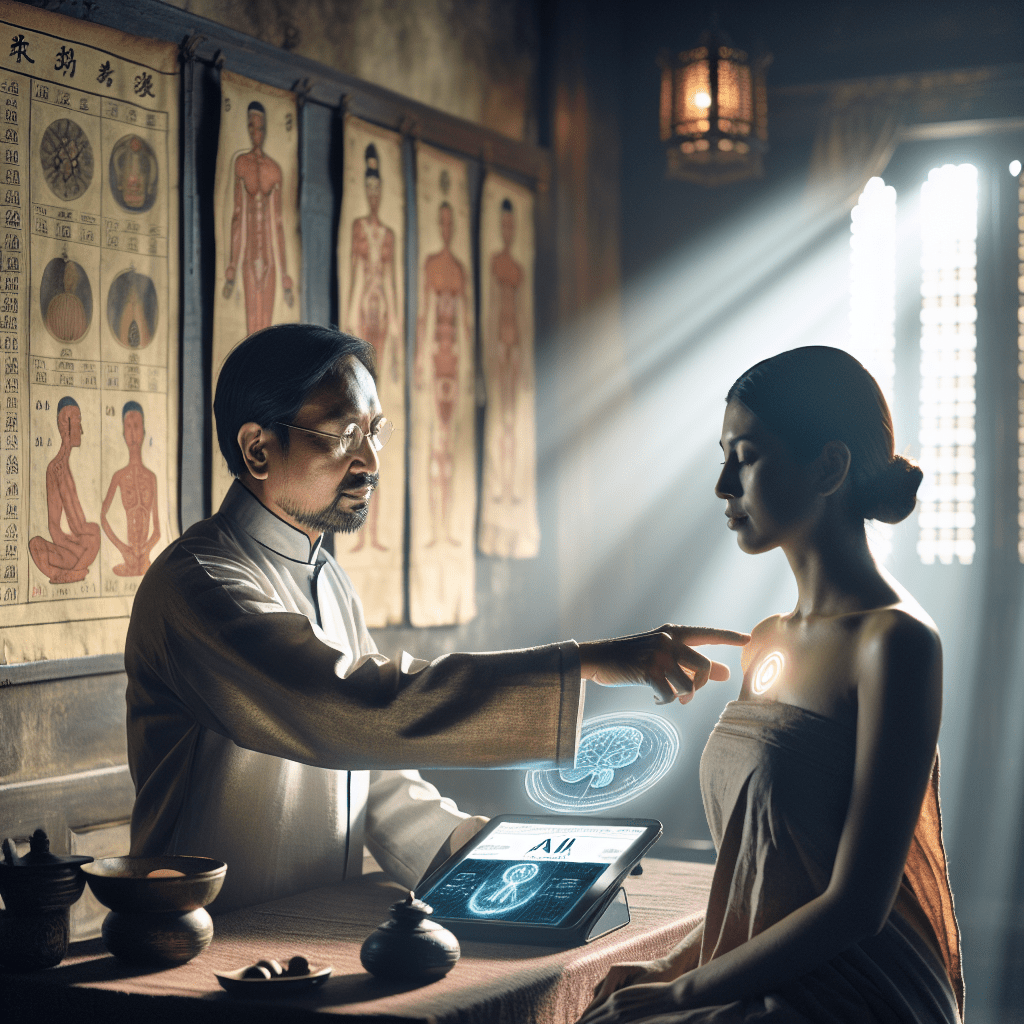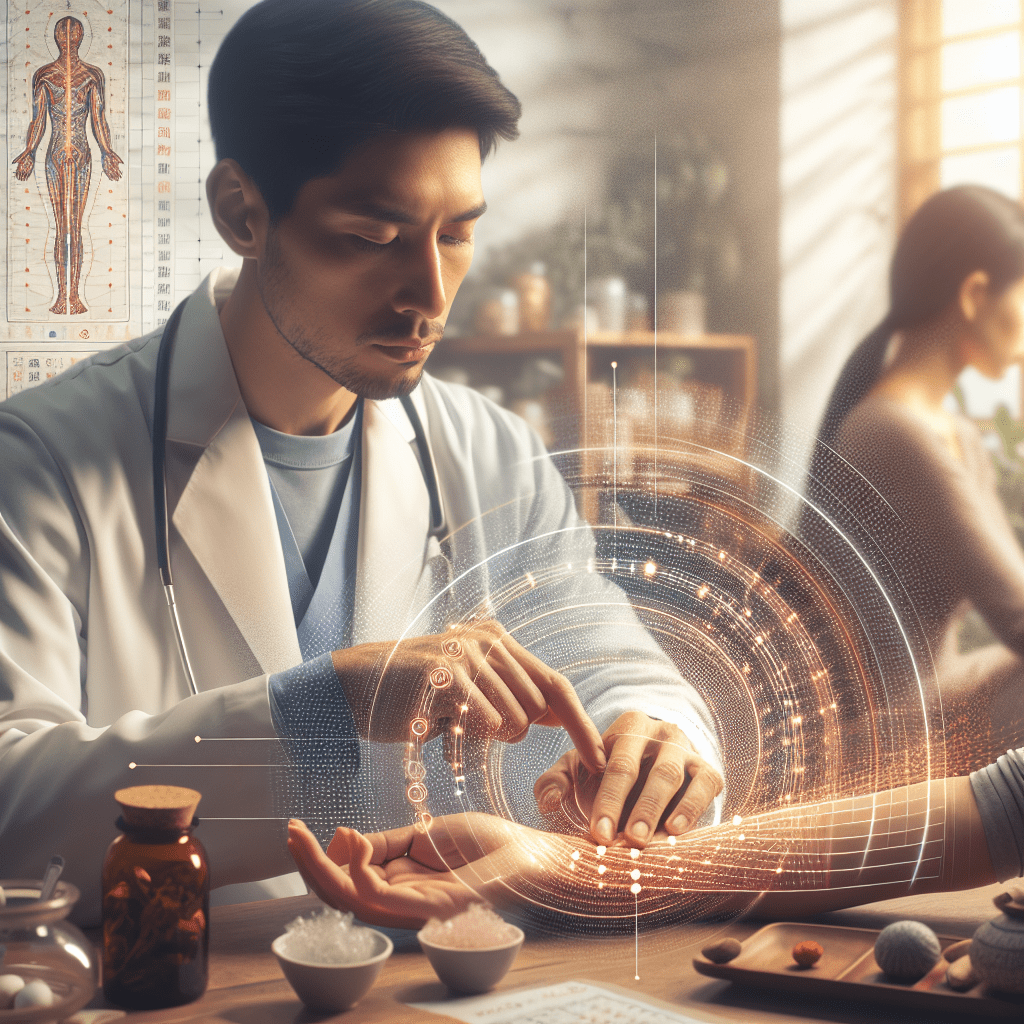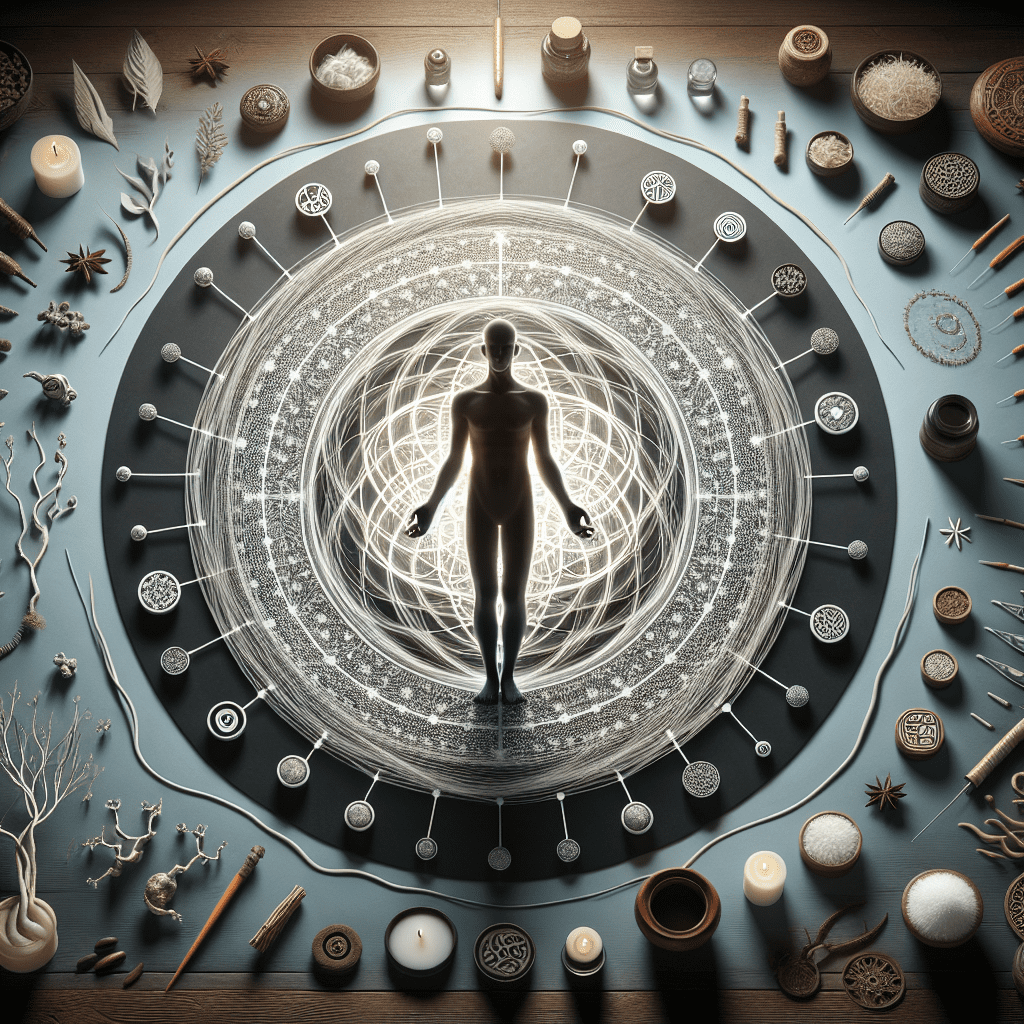Traditional Chinese Medicine (TCM) has been a cornerstone of healing practices for thousands of years. With its rich history dating back over two millennia, TCM offers a holistic approach to health that focuses on achieving balance within the body and between the body and its environment. Unlike Western medicine’s focus on treating specific symptoms, TCM looks at the whole person—mind, body, and spirit—seeking to restore harmony through natural methods like herbal remedies, acupuncture, dietary therapy, and mindful movement practices.
At its heart, TCM believes in the concept of Qi (vital energy), the balance of Yin and Yang, and the interconnectedness of our internal systems with the natural world. These principles have guided generations of healers who carefully observed patterns in nature and the human body, developing sophisticated diagnostic techniques based on pulse reading, tongue examination, and detailed patient interviews.
Many of us today are drawn to Eastern healing philosophies because they offer something different—a gentler, more integrated approach that honors the body’s innate wisdom and healing capabilities. In our fast-paced, often disconnected modern world, the TCM perspective feels grounding and intuitive, reminding us that we are part of nature, not separate from it.
AI’s Growing Role in Healthcare
While TCM represents ancient wisdom, Artificial Intelligence (AI) stands at the cutting edge of modern innovation. In recent years, AI has been making remarkable strides in healthcare, transforming how we diagnose, treat, and manage health conditions. From detecting cancers earlier than human radiologists to predicting patient deterioration in hospitals, AI systems are proving their worth as powerful tools for healthcare professionals.
What makes AI particularly valuable is its ability to process vast amounts of data and identify patterns that might escape human notice. Machine learning algorithms can analyze thousands of medical images, patient records, and research papers, learning continuously to improve their accuracy and insights. This data-processing power is helping doctors make more informed decisions and develop increasingly personalized treatment plans.
For health-conscious individuals seeking the most effective and advanced care options, AI-enhanced healthcare offers exciting possibilities. Imagine receiving treatment recommendations tailored specifically to your genetic makeup, lifestyle factors, and personal health history—all analyzed and optimized by sophisticated AI systems that can consider far more variables than any single doctor could manage.
The Meeting of Ancient Wisdom and Modern Technology
The convergence of AI and TCM represents a fascinating intersection where ancient wisdom meets cutting-edge technology. This unlikely pairing is opening new doors for both traditions, creating opportunities to enhance, preserve, and validate centuries-old healing practices through modern scientific methods.
One of the most significant developments is the digitization of TCM knowledge. Ancient medical texts, some dating back to the Han Dynasty, are being carefully digitized and translated into formats that AI systems can analyze. This preservation effort is crucial, as it not only protects valuable historical knowledge but also makes it accessible to researchers worldwide. The “Digital Chinese Medicine Library” project, for example, has already digitized thousands of classical medical texts, creating a searchable database that both human practitioners and AI systems can reference.
“We’re not replacing traditional knowledge with technology,” explains Dr. Lin Wei, a TCM practitioner and digital health researcher. “We’re using technology to ensure this precious wisdom isn’t lost and can continue evolving in the modern era.”
This digital preservation also enables cross-cultural sharing of TCM concepts, making Eastern healing philosophies more accessible to Western practitioners and patients curious about alternative approaches to wellness. Through AI TCM modernization efforts, ancient diagnostic techniques and treatment protocols are finding new life in contemporary healthcare settings.
Machine Learning Meets Traditional Diagnosis
One of the most promising applications of AI in TCM lies in the realm of diagnosis and treatment planning. Traditional TCM diagnosis requires years of training and experience as practitioners learn to recognize subtle patterns in pulse qualities, tongue appearances, and symptom clusters. These diagnostic methods, while powerful, can be subjective and vary between practitioners.
Machine learning algorithms are now being trained on thousands of TCM diagnosis cases, learning to recognize patterns and correlations that define different syndrome types. For example, researchers at the Shanghai University of Traditional Chinese Medicine have developed AI systems that can analyze tongue images with over 90% accuracy, matching diagnoses made by experienced TCM doctors.
These AI-assisted diagnostic tools don’t aim to replace human practitioners but rather to support their work by providing additional data points and suggestions. The combination of human intuition and AI analysis creates a more robust diagnostic approach that aligns perfectly with HerbalsZen’s philosophy of combining the best of both worlds.
Additionally, machine learning can analyze large patient datasets to identify which treatments have been most effective for specific constitution types and conditions. This data-driven approach helps create truly personalized treatment plans that honor TCM’s tradition of individualized care while incorporating statistical evidence of what works best for similar cases.
AI-Enhanced Diagnostic Tools in TCM
Beyond general diagnostic support, specialized AI tools are being developed to enhance specific aspects of TCM practice. These innovative technologies are making TCM diagnostics more precise, consistent, and accessible.
Pulse diagnosis, a cornerstone of TCM assessment, traditionally requires a practitioner to feel subtle variations in a patient’s pulse at three positions and three depths on each wrist. Now, AI-enabled pulse reading devices can capture these subtle variations digitally, analyzing the waveforms to identify patterns associated with different health conditions. These devices can detect nuances that even skilled practitioners might miss, providing objective measurements to complement subjective assessments.
Similarly, facial diagnosis has been enhanced through computer vision technology that can identify subtle color changes, texture variations, and facial features linked to internal imbalances according to TCM theory. These systems can track changes over time, helping practitioners monitor treatment progress with greater precision.
Herb recognition systems using computer vision can instantly identify medicinal herbs and validate their authenticity and quality, addressing a critical challenge in ensuring the safety and efficacy of herbal remedies. One such system developed by researchers in Beijing can distinguish between 500+ medicinal herbs with near-perfect accuracy, even identifying subtle differences between similar-looking species.
For patients, these AI-enhanced diagnostic tools mean more consistent assessments, reduced variability between practitioners, and the ability to track subtle changes in their condition over time—all while maintaining the holistic perspective that makes TCM so valuable.
Advancing Research Through AI
Perhaps one of the most exciting applications of AI in TCM is its ability to accelerate research and deepen our understanding of how traditional remedies work. TCM herbal formulas often contain dozens of ingredients with hundreds of bioactive compounds interacting in complex ways. This complexity has made scientific validation challenging using conventional research methods.
AI systems excel at analyzing these complex interactions, identifying how different compounds work together to produce therapeutic effects. For example, researchers using network pharmacology (an AI-driven approach) have mapped how compounds in the classic formula Gui Zhi Tang interact with multiple biological targets to reduce inflammation and improve circulation.
Machine learning algorithms are also helping identify potential new applications for traditional remedies by analyzing their molecular structures and predicting biological effects. This approach has already led to the discovery of novel applications for well-known herbs, expanding their therapeutic potential.
“AI is helping us understand the scientific mechanisms behind TCM theories that have been empirically proven for centuries,” notes Dr. Zhang Mei, a pharmaceutical researcher specializing in herbal medicine. “We’re not disproving traditional knowledge but rather building bridges between Eastern and Western medical paradigms.”
This research validation is particularly valuable for health-conscious consumers who appreciate TCM’s natural approach but also want evidence-based assurance of safety and efficacy—exactly the balance that HerbalsZen strives to provide.
Challenges and Ethical Considerations
Despite its promising potential, the integration of AI and TCM faces significant challenges and raises important ethical questions that must be thoughtfully addressed.
Data quality remains a primary concern. TCM diagnosis relies heavily on subjective assessments and terminology that doesn’t always translate neatly into the structured data formats AI systems prefer. Creating standardized, high-quality datasets while preserving the nuanced, holistic nature of TCM diagnosis requires careful attention.
There’s also the risk of oversimplification. TCM’s strength lies in its personalized, context-sensitive approach that considers the whole person. AI systems must be designed to preserve this holistic perspective rather than reducing TCM to simplified algorithms that miss the forest for the trees.
Data privacy concerns are particularly relevant when dealing with comprehensive health assessments that include physical, emotional, and lifestyle factors. Ensuring patient data is protected while enabling the learning potential of AI systems requires robust ethical frameworks and security measures.
Perhaps most importantly, there’s the question of maintaining TCM’s philosophical essence. “Technology should serve the core principles of TCM, not reshape them to fit technological limitations,” cautions Dr. Wang Ling, a TCM ethics specialist. “We must ensure AI enhances the human elements of healing rather than diminishing them.”
These challenges remind us that thoughtful integration is essential—rushing to digitize and automate without preserving the heart of TCM would represent a significant loss rather than advancement.
The Future of AI TCM Modernization
Looking ahead, the future relationship between AI and TCM appears bright with possibility. As these technologies mature and integration challenges are addressed, we can envision a healthcare landscape where ancient wisdom and modern innovation work hand in hand to improve health outcomes globally.
Imagine virtual TCM consultations enhanced by AI that can analyze your voice patterns, facial coloration, and even pulse through smartphone sensors, making personalized TCM guidance accessible even in regions without local practitioners. Or consider smart herbal dispensing systems that can precisely customize formulas based on individual constitution types and current health status, ensuring optimal efficacy.
Research collaborations between AI specialists and TCM experts will likely continue to expand our understanding of traditional remedies, potentially leading to new generations of natural therapeutics that combine the best of both worlds. These evidence-backed natural solutions would appeal to health-conscious individuals seeking alternatives to conventional pharmaceuticals.
Educational applications also show tremendous promise, with AI-enhanced learning systems helping new practitioners master the complex pattern recognition skills that TCM diagnosis requires. These systems could help preserve and transmit traditional knowledge to future generations while incorporating new insights from ongoing research.
For patients, the integration of AI and TCM offers the prospect of truly personalized care that honors individual uniqueness while being informed by collective wisdom—both ancient and modern. This vision aligns perfectly with HerbalsZen’s mission of merging time-tested Eastern healing philosophies with cutting-edge technology to support holistic wellness.
The journey of AI TCM modernization is just beginning, but it represents a fascinating example of how honoring tradition doesn’t mean rejecting innovation. Instead, by thoughtfully combining these seemingly opposite approaches, we may discover new pathways to health that neither could fully achieve alone.




